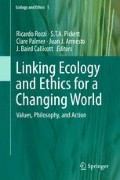Abstract
Although the scientist has succeeded the shaman and the priest as the custodian of unimpeachable knowledge of an esoteric reality beyond the ken of ordinary mortals, science is a social institution embedded in a larger worldview, from which it draws metaphors that reflect and reinforce that worldview. Thus to turn a critical eye on such scientific metaphors as “exotic,” “alien,” and “invasive” species is vital both to understanding and conserving the natural environment. Seizing on this dialectical relationship between science and worldview, Aldo Leopold essayed to reform the prevailing worldview to reflect the conceptual contours of evolutionary biology and ecology. Although now most renowned for his development of an evolutionary-ecological worldview and “land ethic,” Leopold was an engaged naturalist, deeply involved in conservation policymaking. Likewise, Rachel Carson was more than a critic of DDT and other organochlorine insecticides, she too deserves a place alongside Henry Throeau, John Muir, and Aldo Leopold in the pantheon of environmental philosophy and ethics. While moral values are certainly critical drivers of human behavior in regard to the natural environment, aesthetic values are perhaps even more critical. They have played a central role in the national-park movement, not only in North America but all over the world. Thus careful reflection and realignment of aesthetic values, as well as moral values, within the emerging evolutionary-ecological worldview is vitally important to conservation as the twenty-first century unfolds.
Abstract
Although the scientist has succeeded the shaman and the priest as the custodian of unimpeachable knowledge of an esoteric reality beyond the ken of ordinary mortals, science is a social institution embedded in a larger worldview, from which it draws metaphors that reflect and reinforce that worldview. Thus to turn a critical eye on such scientific metaphors as “exotic,” “alien,” and “invasive” species is vital both to understanding and conserving the natural environment. Seizing on this dialectical relationship between science and worldview, Aldo Leopold essayed to reform the prevailing worldview to reflect the conceptual contours of evolutionary biology and ecology. Although now most renowned for his development of an evolutionary-ecological worldview and “land ethic,” Leopold was an engaged naturalist, deeply involved in conservation policymaking. Likewise, Rachel Carson was more than a critic of DDT and other organochlorine insecticides, she too deserves a place alongside Henry Throeau, John Muir, and Aldo Leopold in the pantheon of environmental philosophy and ethics. While moral values are certainly critical drivers of human behavior in regard to the natural environment, aesthetic values are perhaps even more critical. They have played a central role in the national-park movement, not only in North America but all over the world. Thus careful reflection and realignment of aesthetic values, as well as moral values, within the emerging evolutionary-ecological worldview is vitally important to conservation as the twenty-first century unfolds.
Access this chapter
Tax calculation will be finalised at checkout
Purchases are for personal use only
Author information
Authors and Affiliations
Corresponding author
Editor information
Editors and Affiliations
Rights and permissions
Copyright information
© 2013 Springer Science+Business Media Dordrecht
About this chapter
Cite this chapter
Callicott, J.B. (2013). Introduction to Ecological Worldviews: Aesthetics, Metaphors, and Conservation. In: Rozzi, R., Pickett, S., Palmer, C., Armesto, J., Callicott, J. (eds) Linking Ecology and Ethics for a Changing World. Ecology and Ethics, vol 1. Springer, Dordrecht. https://doi.org/10.1007/978-94-007-7470-4_8
Download citation
DOI: https://doi.org/10.1007/978-94-007-7470-4_8
Published:
Publisher Name: Springer, Dordrecht
Print ISBN: 978-94-007-7469-8
Online ISBN: 978-94-007-7470-4
eBook Packages: Biomedical and Life SciencesBiomedical and Life Sciences (R0)

